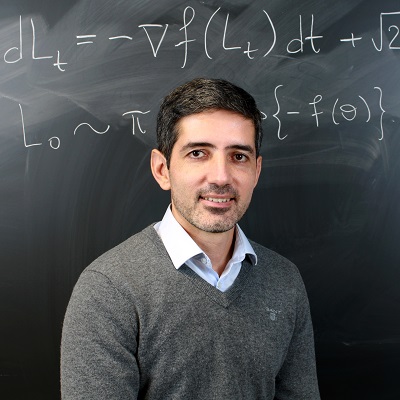Statistics 1
Teacher
DALALYAN Arnak
Department: Statistics
ECTS:
4
Course Hours:
19.5
Tutorials Hours:
16.5
Language:
French
Examination Modality:
écrit+CC
Objective
This course provides the mathematical foundations of statistical modeling, primarily within a parametric framework. The inferential approach is developed with a focus on parameter estimation methods. The properties of estimators, particularly in terms of optimality, will be studied.
Learning outcomes: At the end of the course, the student will be able to:
- Identify the nature of a statistical model: regular, discrete, density-based, identifiable;
- Apply general parametric estimation methods, such as the method of moments estimator, the maximum likelihood estimator, and the Bayesian estimator;
- Analyze the asymptotic behavior of estimators;
- Assess the optimality of parametric estimation methods;
- State and apply the general principles for constructing confidence regions and use them in common scenarios.
Assessment:
- 2/3 of the final grade will be based on the written end-of-semester exam;
- 1/3 of the grade will be based on continuous assessment, itself composed of a mid-term exam (50%), an attendance grade (25%), and a participation grade (25%).
Planning
Numbers in brackets correspond to the sections of the lecture notes.
- Session 1: Limit theorems [1.4] + Continuity theorems [1.5]
- Session 2: Sample [4.1], empirical distribution function [4.2], Glivenko-Cantelli
- Session 3: Substitution method [4.3], statistics Xn-bar and S^2 [4.5 without Proposition 4.4]
- Session 4: Identifiable statistical model, density-based, discrete [5.1] + consistency [5.2]
- Session 5: Risk [5.2.1] + comparison [5.2.2] + Cramér-Rao inequality
- Session 6: van Trees inequality and examples
- Session 7: Generalized method of moments [5.3]. Likelihood and log-likelihood
- Session 8: MLE: behavior of the log-likelihood [5.5] and consistency [5.6]
- Session 9: MLE: regularity conditions and asymptotic normality
- Session 10: MLE: geometric interpretation, asymptotic efficiency, and examples
- Sessions 11 and 12: Bayesian estimation
- Session 13: Confidence sets
References
Lehmann E.L. et G. Casella (2003) Theory of point estimation, 2nd edition, Springer-Verlag [21 LEH 00 D]
Tsybakov A. (2006) Polycopié du cours de Statistique Appliquée, Université Pierre et Marie Curie. Available in PDF format on Pamplemousse.
Wasserman L. (2004) All of Statistics, Springer-Verlag [21 WAS 00 A]










